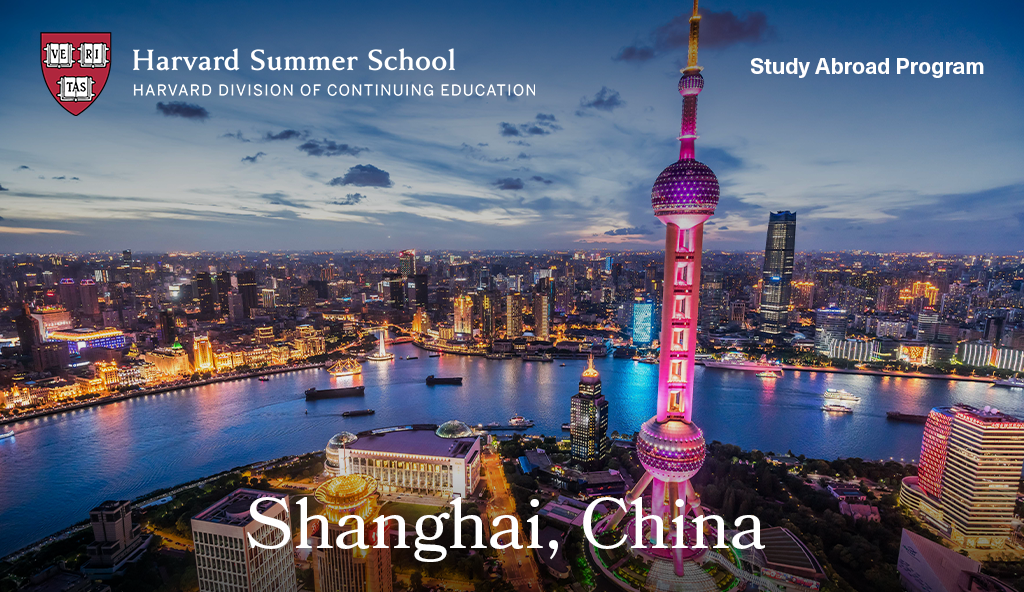Immerse yourself in Shanghai while exploring US-China relations and Chinese cuisine, combining field trips and research to create your own academic or creative project!
The Harvard China Fund facilitates and co-funds this program.

Apply on the Harvard Summer School website!
About the Program
From treaty port to revolutionary hotbed to global metropolis, the city of Shanghai has connected diverse peoples, cultures, cuisines, and economies from various parts of China and around the world. Interweaving cultural studies with history, this program will help you understand Shanghai, and China more broadly, in regional and international contexts through engagement with a variety of historical, literary, and cinematic texts. In addition to classes, you will take field trips to historical landmarks, neighborhoods, museums, eating establishments, and factories, occasionally venturing beyond the city to neighboring provinces. You will also learn to make your own, new discoveries using original research, so that you can use your experiences in Shanghai to produce your own creative project or academic paper.
Program dates: June 16 to August 8, 2025
Apply by: January 30, 2025
Housing: Hotel
Hybrid Info Session: Dec. 9, 2024, from 3:30 – 5:00 pm EDT. Please RSVP here.
Program Structure
The program counts as two semester-long courses (4 credits each) of degree credit. Both program courses can count towards East Asian Studies concentration credit.
HIST S-1833 Study Abroad in Shanghai: Global Food —The Case of China

Joyce Chaplin, James Duncan Phillips Professor of Early American History, Harvard University
4 credits
UN Limited enrollment.
The global domination of foods domesticated in China, the globalization of elements of Chinese cuisine, and the planetary impact of food production in and for China are all significant measures of how food and eating have enormous consequences. That this has happened reveals the amazing dimensions of human creativity and adaptability, though it also raises questions about environmental sustainability. How have individual food choices, national food policies, and international events connected the larger world to China, both the social or political worlds of other human beings and the natural world of all other living beings?
HIST S-1827 Study Abroad in Shanghai: The United States and China—Opium War to Present

Erez Manela, Francis Lee Higginson Professor of History, Harvard University
4 credits
UN Limited enrollment.
The relationship between China and the United States is now, and will likely continue to be, among the most important international relationships of our era. But this relationship has a long history, a history which we must study if we wish to understand present and future challenges and opportunities more fully. In this course, students explore diverse aspects of the history of Sino-American relations since the early nineteenth century. We cover major episodes such as the Boxer intervention, the first and second world wars, the Korean War, the Mao-Nixon rapprochement, and the post-Mao relationship. We also examine central themes such as trade, migration, cultural perceptions, war, and revolution.
Where You’ll Live and Study
The city of Shanghai evolved from a treaty port to a revolutionary hotbed to a global metropolis from the 19th century to the 21st century. Famed for its “East-meets-West” cosmopolitanism, Shanghai has brought together diverse peoples, cultures, and economies from various parts of China and around the world. It thus becomes a perfect locale for the study of intercultural exchange, economic development, and globalizing processes more broadly.
Accommodations
You will live in an on-campus hotel at Fudan University. Hotel amenities include wi-fi, 24/7 concierge, refrigerator, daily housekeeping, laundry, safe for storage of valuables, cafeteria and gym. You will have opportunities to meet students from different parts of China and with diverse interests. Apart from all the practical conveniences of a student district, the campus also offers library access and will be an ideal base for your creative and research projects.
Application
To apply, you must:
- Be at least 18 years old
- Have completed at least one year of college or be a first-year student
- Be in good academic standing
Students enrolled at any accredited university are welcome to apply. See the How to Apply page for more information.
The Summer 2025 application will be available in early December.
Each program has unique requirements included in the online application. Beginning your application early is the best way to ensure that you have sufficient time to review and complete the application requirements by the deadline.
You may apply to no more than two programs; if applying to two programs, you will be asked to rank your two applications in order of preference (first and second choice). Any applications submitted in excess of the maximum of two will be automatically withdrawn. You will be notified of your admissions status in each program in early March.
A complete online application includes:
- Basic personal information
- A statement of interest
- Your most recent transcript
- Program-specific requirements (if applicable; may include letters of recommendation, etc.)
Interviews may be requested at the discretion of the program.
Be sure to read about the funding options available for Harvard Summer School Study Abroad programs.
If you have questions about the application, please contact the Harvard Summer School Study Abroad Office by email at summerabroad@summer.harvard.edu.

Cost & Expenses
The program fee includes:
- Tuition
- Accommodations
- Scheduled program activities
- Some meals (the program will provide further details)
- Harvard Summer School health insurance plan
You will also need to budget for a number of expenses not covered by the program fee. The amounts listed below for these out-of-pocket expenses are approximate, and you may incur additional expenses not noted here. Your actual expenses will depend on a number of factors, including personal spending habits and currency exchange rates. Note that expense categories–especially airfare–may be subject to significant fluctuations.
- International airfare ($2,000 – $2,200)
- Ground transportation ($250)
- Meals ($1000)
- Personal expenditures, communications, course materials, visa fee, and miscellaneous ($500)
If you have specific questions about personal budgeting, please contact the program directly.
See Funding and Payment for information on how to submit payments and funding options.
Additional Information
- Questions? Contact Emmeline Liu at emmeline_liu@fas.harvard.edu.
- Need an accommodation? See Students in Need of Accommodations to request one through the Accessibility Services Office.
- Accepted to the program? See Admitted Students for information about pre-departure requirements.